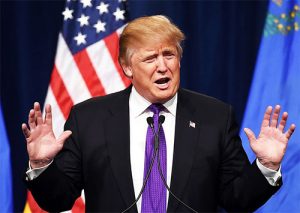President Trump: Math Is Hard

President Donald Trump
Since 1990, when his landmark Taj Mahal casino and hotel defaulted on interest payments to its bondholders, businesses owned by Donald Trump have filed no less than six times for bankruptcy. In fact, asking the courts for protection against duped creditors whilst shaving off shareholder equity seems a Trump hallmark.
With the release of the 2018 federal budget – the first compiled by the new administration – it has become clear why the president’s business undertakings fail to meet investors’ expectations – double counting.
Worryingly named A New Foundation for American Greatness, the 2018 budget contains a number of contradictions and plain accounting errors, the most glaring of which results in $2 trillion being spent twice. The amount corresponds to the extra tax revenue expected to flow into federal coffers over the coming decade due to robust economic growth. In the budget, the windfall is clearly earmarked to cut the deficit.
A few pages along, the Trump Administration touts its tax reform which, it assures, will be “deficit neutral”. In other words, any future tax cuts will not negatively impact the revenue received by the US government. Such a “deficit neutral” set of tax cuts can be enacted in two ways: broadening the tax base – increasing the number of people who pay taxes and/or closing fiscal loopholes – or counting on economic growth – spurred by tax cuts – to compensate for the loss in revenue by enlarging the tax base.
Here’s the problem: even assuming that accelerated economic growth will produce an extra $2 trillion in federal revenue, that money cannot be spent twice: it either compensates the loss of income resulting from the tax cuts, or is used towards reducing the deficit. President Trump, however, says that he can do both at the same time. It explains why the man is without equal.
That is not the only trick up Mr Trump’s sleeve. On page 13 of the budget, he proposes to eliminate the death tax paid by heirs on estates greater than $5.5 million. Yet, six pages later, table S-3 breaks down the federal government’s tax receipts by category – one of these being estate tax. The table shows that over the next ten years Uncle Sam expects to rake in up to $328 billion creaming off estates. In fact, the takings are set to double over that period from $21bn in 2018 to $43bn in 2027. Notwithstanding written assurances to the contrary, President Trump has no intention of doing away with the death tax.
Former Treasury Secretary Larry Summers called the Trump Administration’s blatant double counting the “most egregious error in a presidential budget in living memory”. However, Budget Director Mick Mulvaney, a Tea Party luminary and founder of the House Freedom Caucus that aims to dismantle Obamacare, says his fake math is part of a cunning plan to boost GDP growth while shrinking the deficit: “We can assume three scenarios after the tax reform is implemented: it could reduce the deficit, it could add to the deficit, or turn out to be deficit neutral. Given the fact that we’re this early in the process about dealing with tax reform, we thought that assuming that middle road was the best way to do it.”
In other words: the Trump Administration is clueless when it comes to budgeting. Luckily, even Republican senators declared the budget, first unveiled on Wednesday, dead on arrival while House Republicans were barely able to contain their shock – feigned or otherwise – at the draconian proposals which include a 50% spending cut for Medicaid, and a 30% reduction of the Environmental Protection Agency’s budget. The State Department is set to lose 29% of its budget whilst the National Endowment for the Arts would cease to exist altogether. The budget does, however, earmark $1.6bn for President Trump’s border wall and seeks to up defence spending by $52bn.
You may have an interest in also reading…
Natrium: Taking a Nuclear Leap Towards a Low-Carbon Future
In June 2024, a silent revolution was taking place in the windswept plains of Kemmerer, Wyoming… A groundbreaking ceremony took
Why Coffee and Chocolate Prices Are Heating Up in 2025
If you’re a fan of mocha lattes or indulgent chocolate treats, 2025 might be a challenging year for your wallet.
Financial Centres Promote Economic Development: AIFC Goes for Growth by Backing SMEs Globally
International Financial Centres (IFCs) are a necessary component of national and global economic growth. And increasingly, it is co-operation between


















































































